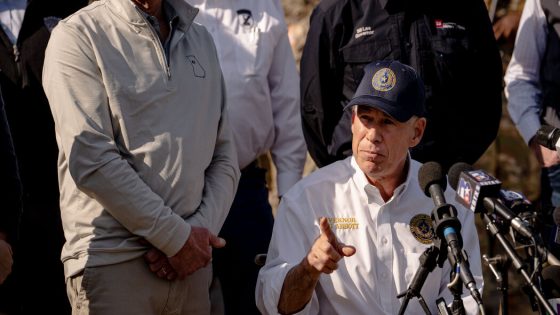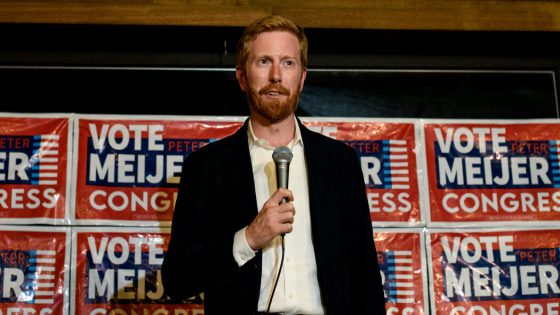Since the start of the Biden administration, Gov. Greg Abbott of Texas has mounted an increasingly brazen challenge to the federal government over immigration, questioning the notion, long upheld by federal courts, that it is Washington, and not border states, that sets immigration policy.
Mr. Abbott has been able to notch some important victories, pushing the boundaries of what a governor can do when it comes to immigration enforcement.
With the support of the Republican-dominated Texas Legislature, he has poured more than $10 billion into a long-term deployment of state police and National Guard troops on the border, transforming portions of Texas communities along the Rio Grande into quasi-military encampments, complete with bases for soldiers and boundaries of concertina wire.
“Texas is doing its part to secure a border made wide open by Joe Biden,” Mr. Abbott said at the start of a news conference in December near a section of towering steel border fencing installed and paid for by the state.
Lawyers for Mr. Abbott and the state of Texas were headed to a federal appeals court on Wednesday for what the governor has appeared to be seeking all along: a showdown with the federal government over Texas’s power to set its own immigration policy.
The legal battle is over the state’s most ambitious and audacious challenge yet to federal supremacy over immigration: a new law, signed by the governor, that makes it a crime for migrants to cross without authorization into Texas from a foreign country, punishable by jail time, deportation by the state, or both.
Even before a final ruling in the case, Mr. Abbott was able to briefly celebrate a win on Tuesday when the U.S. Supreme Court allowed the law, known as Senate Bill 4, to take effect, at least temporarily. For a few hours, the state of Texas was empowered by the high court to take immigration enforcement more fully into its own hands.
But officers in Texas had not yet made arrests under the law when, later in the day on Tuesday, the U.S. Court of Appeals for the Fifth Circuit issued an order dissolving its earlier stay and restoring, for the moment, an injunction blocking implementation of the law.
The ultimate outcome in the case remained an open question. A three-judge panel of the Fifth Circuit was set to hear arguments on whether to set aside the injunction during the many months it would take for Texas to appeal the ruling, or restore the injunction and keep the law on hold while the case went through the appeals process.
But for Mr. Abbott, the focus on the border, and the legal wrangling over his border enforcement program, known as Operation Lone Star, have already brought major political gains.
His direct challenges on immigration policy — a top issue for Texans, particularly Republicans — have won him strong backing within his own party and majority support in the state.
His legal fights with the Biden administration have rallied Republican governors from around the country to his side, prompting 25 of them to join a declaration in January that they “stand with Texas.”
Mr. Abbott beamed as he sat next to Donald J. Trump during a recent visit by the former president to the border city of Eagle Pass. Later, he played off Mr. Trump’s suggestion that he might be considered as a running mate.
“He’s very kind in suggesting things like that,” Mr. Abbott said in an interview, adding that he was “deeply committed” to governing Texas and would eventually seek a fourth term.
However, Mr. Abbott was not always viewed fondly by immigration hard-liners and Trump supporters. During his re-election campaign in 2022, he faced primary challenges from several Republicans, including a former state senator, Don Huffines, who repeatedly challenged Mr. Abbott to take more aggressive steps on the border. Tucker Carlson, the former Fox News host, invited Mr. Huffines to appear on his show and join him in attacking the governor in 2021.
Since then, Mr. Abbott has done a hard pivot, one he insists was motivated not by political pressure but by what he says was the federal government’s failure to adequately secure the border.
He has deployed thousands of National Guard members to the border.
He used a migrant busing program, initially derided by critics as a political stunt, to send more than 100,000 migrants out of state, transforming the record number of arrivals in Texas into an urgent political issue for Democrats in cities like New York and Chicago. The busing program divided his political adversaries and helped to change the terms of the national debate over immigration.
He placed a barrier of buoys in the Rio Grande, forcing the federal government to fight him in court to remove them. He directed the state police to create a program of arresting migrants found on private ranchland and charging them with criminal trespassing.
And in a move clearly intended to confront head-on the constitutional questions of whether any state has the right to assume the federal government’s role on immigration, Mr. Abbott put forward a legal theory of a migrant “invasion” advanced by Mr. Huffines and some former Trump administration officials. The governor formally declared the arrival of record numbers of migrants an invasion and invoked a section of the U.S. Constitution that according to his argument allows states to assume war powers in such situations.
Mr. Abbott has since repeated his declaration of an invasion. Lawyers for Texas cited the legal theor of an invasion as one of their arguments in defense of the migrant arrest law.
In issuing an injunction against the law last month, a federal district judge in Austin said the invasion argument failed on several counts, dismissing the idea that Texas was somehow at war. The Texas law violated federal statutes and was unconstitutional, the district court ruled, citing decades of federal court rulings and Supreme Court precedent.
But it was clear that Mr. Abbott, with an eye on the new 6-3 conservative majority on the Supreme Court, fully intended to challenge those precedents, most notably a 2012 decision, Arizona v. United States, in which the high court by a 5-to-3 vote reaffirmed the federal government’s broad power over immigration.
The bold legal gambit may ultimately fail in court. But for the governor, it has already been a winning strategy.
Source Agencies




